Famous as both a publisher and a songwriter, Albert Von Tilzer and his brothers Harry Von Tilzer and Will Von Tilzer represent another great success story of the ragtime era, even though they more or less wrote about and promoted ragtime, never writing any actual rags. They also prove to be a bit frustrating in terms of research, since much of the information on their early lives was relayed by the brothers themselves, and matching facts before 1900 are hard to corroborate. But a find has been made here that adds some interest to the Von Tilzer story.
Early Years
Given their birth dates and locations, and matching the demographics of their parents, it appears that the brothers were born to Jacob Gumbinsky (or Gummbinsky) and Sarah Tilzer, Polish immigrants who may have actually lived in Germany before coming to the United States. In later years, Albert often put Indiana as their place of birth, and Harry and Jacob switched between Germany and Poland, which was a little more helpful. Older brother Jules lists Russia, which is even more consistent with Poland. Given that all other factors match, it is likely that Harry was born as Aaron Gumbinsky in Detroit, Michigan, as were his older brothers Louis (9/22/1870 - later Jacob or Jack) and Julius (11/1868 - later Jules). There were also two other siblings, one boy and one girl, but they died in infancy in 1873 and 1874.
Between 1874 and 1877 the family moved from Detroit to Indianapolis, Indiana, where Albert was born as Elias Gumbinsky (3/29/1878), Albert possibly being a middle name. In the 1880 census, their father Jacob is listed as a hair dresser, but later owned a shoe store, then expanded that into a general store. Sarah worked as a milliner in the store as well. He is listed in the Indianapolis directories of the 1880s as selling "furniture, stoves and tinware" at 434 S. Illinois Street. Harry's memories recall a shoe store, and this would be somewhat consistent, as shoes might be found in such a location. Younger brother Harris Harold, the eventual lawyer for the Von Tilzer brothers, was born in September 1880, followed by Wilbur (Will) in November 1882. This find means that there was a big change in their names (except H. Harold who retained Gumm) and lives following Harry's lead. It has also been said that the family changed their name to Gumm at some point, although this is more likely Harry and Albert since their father was still using Gumbinsky in the 1890s.
While living in Indianapolis, Harry, Julius and Albert were exposed to the joys of stage entertainment as a local theatrical company gave performances in the loft above their father's store. Harry had also been playing piano at an early age, largely, as he recalled, with encouragement from his mother. Albert also followed in Harry's footsteps with similar musical talent. Harry was so enraptured with the lure of performance that he lived out the fantasy of many young boys and left home to join the Cole Brothers Circus in 1886 at age 14. With them he worked as a tumbler and singer, playing the calliope and piano as well.
He left the circus before he was 16 to perform with traveling burlesque and vaudeville shows playing piano and writing tunes and incidental music for them. Even though he had shortened the family name to Gumm it did not suit him, and at some point in his teens he changed it to a derivative of his mother's maiden name, adding "Von" to Tilzer to make it fancier. Albert followed that example sometime in the 1890s, and once the pair became famous, brothers Jules, Jacob (Jack) and Will also changed their names to Von Tilzer, although Will was published as Gumm through around 1912.
With brother Harry on his way to a music career, Albert followed in his tracks to some extent, deciding to abandon high school at first to help with the family business in the shoe and merchandise store, but eventually taking his music skills out into the world.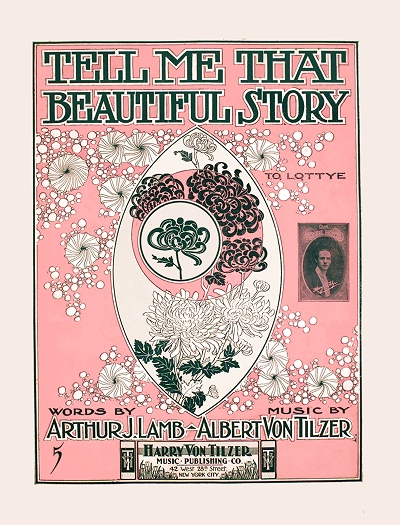 As with Harry, Albert became a musician and sometime musical director of a traveling vaudeville troupe. This lasted for a few years, but once Harry's hit song, My Old New Hampshire Home, landed him a position as a partner with Shapiro and Bernstein in 1899, he sought out Albert, who now considered himself similarly as a Von Tilzer, to run the Chicago branch of the company. Albert had been to Chicago often, and in 1898 had a piece published there, one of many that were reactions to the sinking of the U.S.S. Maine and the brief conflict in Cuba. But now he was able to make a home, have a desk job, and perhaps consider composing more of his own pieces. As of the 1900 census Albert was living in Chicago listed as a music composer, even with only two pieces in print, and Harry was similarly listed as a musician and composer in Manhattan.
As with Harry, Albert became a musician and sometime musical director of a traveling vaudeville troupe. This lasted for a few years, but once Harry's hit song, My Old New Hampshire Home, landed him a position as a partner with Shapiro and Bernstein in 1899, he sought out Albert, who now considered himself similarly as a Von Tilzer, to run the Chicago branch of the company. Albert had been to Chicago often, and in 1898 had a piece published there, one of many that were reactions to the sinking of the U.S.S. Maine and the brief conflict in Cuba. But now he was able to make a home, have a desk job, and perhaps consider composing more of his own pieces. As of the 1900 census Albert was living in Chicago listed as a music composer, even with only two pieces in print, and Harry was similarly listed as a musician and composer in Manhattan.
 As with Harry, Albert became a musician and sometime musical director of a traveling vaudeville troupe. This lasted for a few years, but once Harry's hit song, My Old New Hampshire Home, landed him a position as a partner with Shapiro and Bernstein in 1899, he sought out Albert, who now considered himself similarly as a Von Tilzer, to run the Chicago branch of the company. Albert had been to Chicago often, and in 1898 had a piece published there, one of many that were reactions to the sinking of the U.S.S. Maine and the brief conflict in Cuba. But now he was able to make a home, have a desk job, and perhaps consider composing more of his own pieces. As of the 1900 census Albert was living in Chicago listed as a music composer, even with only two pieces in print, and Harry was similarly listed as a musician and composer in Manhattan.
As with Harry, Albert became a musician and sometime musical director of a traveling vaudeville troupe. This lasted for a few years, but once Harry's hit song, My Old New Hampshire Home, landed him a position as a partner with Shapiro and Bernstein in 1899, he sought out Albert, who now considered himself similarly as a Von Tilzer, to run the Chicago branch of the company. Albert had been to Chicago often, and in 1898 had a piece published there, one of many that were reactions to the sinking of the U.S.S. Maine and the brief conflict in Cuba. But now he was able to make a home, have a desk job, and perhaps consider composing more of his own pieces. As of the 1900 census Albert was living in Chicago listed as a music composer, even with only two pieces in print, and Harry was similarly listed as a musician and composer in Manhattan.The situation in Chicago did not work out well, so Albert moved to New York and in with his brother for a time. He went back to selling shoes while waiting for a better opportunity. Harry did take in his Absent Minded Beggar Waltzes on the short-lived Shapiro, Bernstein & Von Tilzer label, which while not a great hit did give Albert some circulation in Manhattan and a moral boost. It helped him get work as a singer as well, and he was featured on the cover of the 1901 song When the Trees are Filled With Blossoms by Eddie Moran and the contrived Albert Rezlit (Tilzer spelled backwards), "Introduced and Sung by Mr. Albert Von Tilzer." He learned the art of composing from his brother and by trying several takes of his own at it until he felt the material was good enough to shop around. Something else Albert got from Harry was the fine tear-jerker lyricist Arthur J. Lamb, who provided him with the words for Tell Me That Beautiful Story early in 1902. Since Harry had just left his previous partners in an amicable move to start his own publishing house, he took Albert's piece as one of the first in what would prove to be an enormous catalog within a few years. The piece did well and showed that Albert had the same propensity for memorable melodies as his now famous brother. But Albert wasn't quite ready to commit yet, and still maintained other work while making efforts at other compositions, of which very few were published in 1902 and 1903.
Big Breaks and Breakups
In 1903 Albert came up with That's What the Daisy Said published by Harry and penned with his brother Will (still Wilbur), who had recently moved to Manhattan as well. Its success plus Harry's mentorship encouraged him to set out on his own with his brother Jack who had recently moved to New York City. Together they founded the York Music Company late in the year.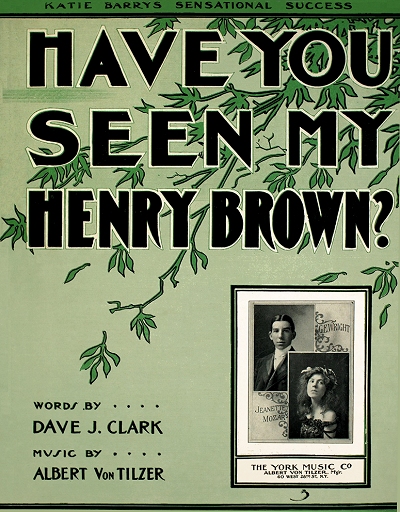 The origin of the name is likely derived from the city it was in (there was already a New York Music Publishing Company), and it seems reasonable that he did not use the Von Tilzer name so as to not be confused with his older brother's self-named firm.
The origin of the name is likely derived from the city it was in (there was already a New York Music Publishing Company), and it seems reasonable that he did not use the Von Tilzer name so as to not be confused with his older brother's self-named firm.
 The origin of the name is likely derived from the city it was in (there was already a New York Music Publishing Company), and it seems reasonable that he did not use the Von Tilzer name so as to not be confused with his older brother's self-named firm.
The origin of the name is likely derived from the city it was in (there was already a New York Music Publishing Company), and it seems reasonable that he did not use the Von Tilzer name so as to not be confused with his older brother's self-named firm.The cause of the break between the brothers is uncertain. However, it was made rather public in mid-1905 when Albert printed advertisements in the New York Clipper and other papers including the announcement, "Having severed my connections with the HARRY VON TILZER MUSIC PUB.CO., I beg to announce to all my friends that I shall be pleased to hear from them, either personally or by mail, at my new place of business." Just the same they would remain on sometimes tenuous but otherwise friendly terms, and even share lyricists and writers for nearly the next two decades. Jack had also parted ways with his brother in late 1904, working as a business manager around Tin Pan Alley for a while, but ultimately hooking up with Albert. Albert and Jack were both listed as the manager of York Music in 1904 and 1905 in city directories. Jack's role was more on the business end of the firm while Albert created and sought out music for the catalog. In 1903, Albert got married to Caddie Neisbaum. The couple would stay together to his death, but there is no indication that they ever had children.
Once he had his own outlet, Albert, in the same way as Harry, suddenly found his way and started pushing out lots of tunes, some of them hits, in collaboration with some of the finest lyricists in Manhattan and beyond. The first great success was Teasing written with Cecil Mack in 1904. Written for the stage show The School Girl, it lasted much longer than the show did, and helped make more of a name for both contributors. It was reported that he was paid the unheard of price of $2,500 for the English publishing rights in advance of publication. With his popularity on the rise and his company doing well, Albert decided to try writing for the Broadway stage, and area that his older brother had just failed in with at least two different shows. His first contribution was a number of songs for Mrs. 'Mac,' The Mayor which lasted only 8 performances, even more dismal than Harry's attempts.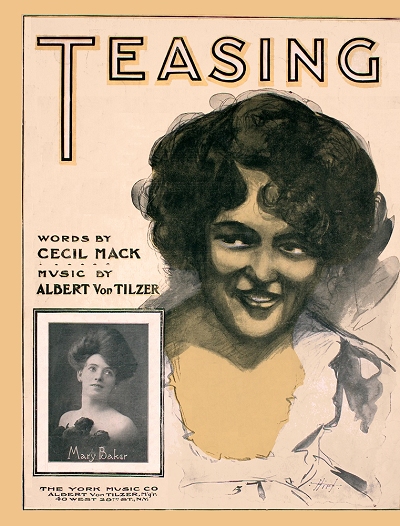 Still, he had another up his sleeve, and In New York Town managed 24 performances divided between three theaters before it was also finally shelved. At this point, Albert went back to focusing on writing hit songs for a while, and wouldn't revisit the stage for another few years.
Still, he had another up his sleeve, and In New York Town managed 24 performances divided between three theaters before it was also finally shelved. At this point, Albert went back to focusing on writing hit songs for a while, and wouldn't revisit the stage for another few years.
 Still, he had another up his sleeve, and In New York Town managed 24 performances divided between three theaters before it was also finally shelved. At this point, Albert went back to focusing on writing hit songs for a while, and wouldn't revisit the stage for another few years.
Still, he had another up his sleeve, and In New York Town managed 24 performances divided between three theaters before it was also finally shelved. At this point, Albert went back to focusing on writing hit songs for a while, and wouldn't revisit the stage for another few years.Will was also working in New York by this time, both as a musician and as an occasional lyricist, getting published in both of his brother's firms, but still under the name Wilbur U. Gumm. His income was largely derived from performance in vaudeville theaters and other places where he would accompany singers, but Will was also learning much about the business of musical publishing from his three older brothers. Harold had moved to New York this time, and equipped with a law degree was getting some work in Manhattan, soon specializing in show business law. Will was working as a manager for Harry's firm starting in 1905, touted in the trades as Von Tilzer rather than Gumm.
Following another trend that brother Harry was on top of, Albert released a dance folio in 1905, a collection of some of his hit tunes without lyrics. These were useful to cabaret and vaudeville pianists as they provided necessary music for their gigs without breaking their budget. Within this folio was one of his rare instrumental numbers, Bunker Hill, originally released in 1904 as a song, which showed Albert to be more capable than Harry in this genre. While 1906 was an otherwise productive year for Von Tilzer, particularly with Lamb, there were no big hits forthcoming. However, he was working with another new partner, vaudeville performer Jack Norworth. In 1907 they penned a tribute to one of the champions of the dying genre of the minstrel show, George "Honey Boy" Evans, titled Honey Boy. It was either the piece itself or Evans' popularity that helped make it a hit, and it encouraged the pair to continue together. Albert also released a decent syncopated instrumental, Cotton, which while it didn't do quite as well as songs of that time, still added to the firm's profits.
The year 1908 would prove to be another turning point for Albert as a composer, and within a decade his work would permanently be embedded in the American songbook. With lyrics by Jack Norworth, the simple waltz song Take Me Out to the Ball Game soon became a national sensation, initially popularized by Norworth's singer wife of the time, Nora Bayes.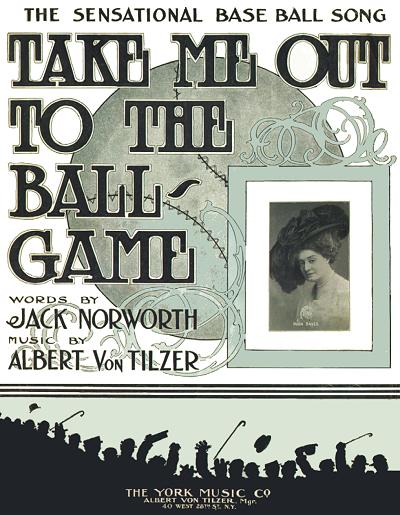 The irony is that neither composer had ever been to a ball game, and would not for at least two more decades. The following year saw fewer songs and no real sellers. Just the same, Albert decided to give the stage another go, and at the end of the year had completed The Happiest Night of His Life, a sappy comedy about a man on his wedding day and night. As with his previous efforts, it proved to be unpalatable for the public, closing after 24 performances. Albert was done with the stage for the time being, as was Harry for all time. To complicate matters, business was proving difficult for York Music Company, and he was looking for a change.
The irony is that neither composer had ever been to a ball game, and would not for at least two more decades. The following year saw fewer songs and no real sellers. Just the same, Albert decided to give the stage another go, and at the end of the year had completed The Happiest Night of His Life, a sappy comedy about a man on his wedding day and night. As with his previous efforts, it proved to be unpalatable for the public, closing after 24 performances. Albert was done with the stage for the time being, as was Harry for all time. To complicate matters, business was proving difficult for York Music Company, and he was looking for a change.
 The irony is that neither composer had ever been to a ball game, and would not for at least two more decades. The following year saw fewer songs and no real sellers. Just the same, Albert decided to give the stage another go, and at the end of the year had completed The Happiest Night of His Life, a sappy comedy about a man on his wedding day and night. As with his previous efforts, it proved to be unpalatable for the public, closing after 24 performances. Albert was done with the stage for the time being, as was Harry for all time. To complicate matters, business was proving difficult for York Music Company, and he was looking for a change.
The irony is that neither composer had ever been to a ball game, and would not for at least two more decades. The following year saw fewer songs and no real sellers. Just the same, Albert decided to give the stage another go, and at the end of the year had completed The Happiest Night of His Life, a sappy comedy about a man on his wedding day and night. As with his previous efforts, it proved to be unpalatable for the public, closing after 24 performances. Albert was done with the stage for the time being, as was Harry for all time. To complicate matters, business was proving difficult for York Music Company, and he was looking for a change.Albert did manage to open an office in Chicago in 1910 which was represented by his older brother Jules. A couple of pieces came out simply as published under his own name in 1910 and 1911. Then good fortune came his way again. Albert had been writing with a female friend, Junie McCree, who had worked with him on The Happiest Night of His Life and some minor hits going back as far as 1905. In 1910 they hit upon Put Your Arms Around Me Honey which soon became a stage sensation when ragged beyond its otherwise standard arrangement. In spite of this, either the strain of the stage musical failure or perhaps some other factor proved to be the end of their five year on and off collaboration. Albert is listed in the 1910 census with Caddie living in a hotel listed as a publisher rather than as a songwriter. Will was living with his lawyer brother Harold. Both Albert and Wilbur are listed as publishers, rather than songwriters. The following year, Wilbur would be the last brother to legally change his name, choosing Will Von Tilzer over Wilbur U. Gumm. Harris Harold Gumm would not follow brothers Jack, Harry, Will or Albert in this change.
Will proved some of his business acumen in an article published in the Music Trade Review on November 4, 1911, concerning the spending of money on songs:
More money is squandered in the popular music publishing field than in any other well established line in existence. It is a well-known fact to people at all familiar with the music publishing business, that there are great money making possibilities in the possession of what is called a "hit," but how many publishers really make money when they get a hit? Not many. The majority turn right around and sink the profits from a successful number into a hoped-for hit.
The great mistake made almost invariably, is to invest money as well as energy in a bad number, thinking it to be the combination that turns out a so-called hit. If you have watched the business closely, you will have observed (if you are honest with yourself) that successful numbers during the past number of years, were hits before they were published. In other words, they possessed unusual merit in themselves and would have been just as successful if plenty of energy had been used and if the money had not been so much in evidence.
To verify the above, the writer wishes to quote as examples the following songs published within the past two or three years : "The Cubanola Glide," "Don't Take Me Home," "I Remember You," "I Love My Wife, but Oh You Kid," "Under the Yum Yum Tree," "I Love It," "Lovie Joe," "All Alone," and many other numbers of lesser size. "All Aboard for Blanket Bay," our present big ballad hit is taking twice as long to make as it would if we squandered money on it. But how do we benefit by exercising judgment and patience? The answer is that it will live twice as long and when we balance our books in the end, we will find that we have made money, not lost it! "Blanket Bay" has been out since the first of January, 1911. To-day it is bigger with both the profession and the trade than ever before, and it is going along at a rate that is astonishing.
"I Want a Girl Just Like the Girl that Married Dear Old Dad," a song we published hardly three months ago, is already acknowledged by everyone, including competitors, to be the most promising song of the year. "They Always Pick on Me," and "Knock Wood" will also be called hits before the season is many months older.
We have had more real hits in the past three years than ever before. What is more important, we have made more money. The last statement takes on extra weight when you consider the small margin of profit to-day. Merit always wins out.
In 1911 Albert came up with one relative hit, That College Rag, but was starting to wear from the business end of things. He brought Will in to York Music to work with Jack on running the company, as well as other musicians with supplying it with product. Albert's output in the period, though reduced, was still fairly significant. It saw the start of his collaboration with newly minted lyricist Lew Brown. Their initial output included average fare like Dapper Dan (The Ladies Man From Dixie Land), but they soon caught on with the consumer with I'm the Lonesomest Gal in Town and Parisienne. One hit and a sad sequel from 1912 consisted of Please Don't Take My Lovin' Man Away and Here Comes The Bride (The Girl Who Stole My Loving Man Away). Near the end of the year, Albert abandoned York Music, putting it in the hands of his brothers Jack and Jules. Then the writing seems to have almost stopped from 1913 through 1915, which may be attributed to a number of unknown factors in Albert's life. It was announced when he left York Music that he would endeavor to be a "producer of vaudeville acts," but there is no evidence of any success in this field. Albert and his brother Harry were charter members of ASCAP, formed in 1914.
More Separation and Success
Will made a change of his own in early 1913, stepping out of the shadow of his famous publisher brother Harry. As reported in the February 22, 1913 edition of The Music Trade Review: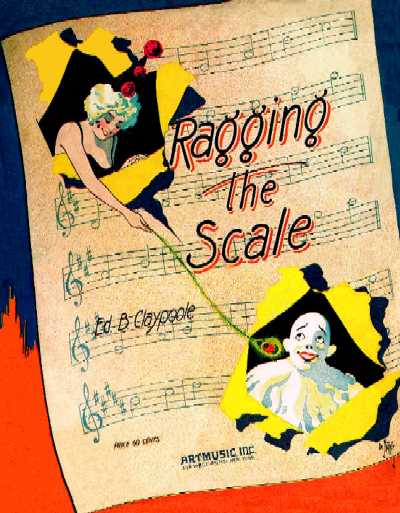 "Will Von Tilzer, who has long been general manager of the Harry Von Tilzer Music Co., has sold out his interest in that firm, and will engage in the business of music publishing on his own account in the Forty-fifth Street Exchange building. Harry Von Tilzer will continue the old business at its present address, 125 West Forty-third street." The company he started was Broadway Music Corporation, started with a capital stock of $500. The initial directors were brother H. Harold Gumm and investor William V. Goldies. Another 1913 announcement noted that: "He has arranged to handle the works of several prominent song writers, including James E. Monaco, writer of 'Row, Row, Row,' and other successes."
"Will Von Tilzer, who has long been general manager of the Harry Von Tilzer Music Co., has sold out his interest in that firm, and will engage in the business of music publishing on his own account in the Forty-fifth Street Exchange building. Harry Von Tilzer will continue the old business at its present address, 125 West Forty-third street." The company he started was Broadway Music Corporation, started with a capital stock of $500. The initial directors were brother H. Harold Gumm and investor William V. Goldies. Another 1913 announcement noted that: "He has arranged to handle the works of several prominent song writers, including James E. Monaco, writer of 'Row, Row, Row,' and other successes."
 "Will Von Tilzer, who has long been general manager of the Harry Von Tilzer Music Co., has sold out his interest in that firm, and will engage in the business of music publishing on his own account in the Forty-fifth Street Exchange building. Harry Von Tilzer will continue the old business at its present address, 125 West Forty-third street." The company he started was Broadway Music Corporation, started with a capital stock of $500. The initial directors were brother H. Harold Gumm and investor William V. Goldies. Another 1913 announcement noted that: "He has arranged to handle the works of several prominent song writers, including James E. Monaco, writer of 'Row, Row, Row,' and other successes."
"Will Von Tilzer, who has long been general manager of the Harry Von Tilzer Music Co., has sold out his interest in that firm, and will engage in the business of music publishing on his own account in the Forty-fifth Street Exchange building. Harry Von Tilzer will continue the old business at its present address, 125 West Forty-third street." The company he started was Broadway Music Corporation, started with a capital stock of $500. The initial directors were brother H. Harold Gumm and investor William V. Goldies. Another 1913 announcement noted that: "He has arranged to handle the works of several prominent song writers, including James E. Monaco, writer of 'Row, Row, Row,' and other successes."Possibly looking for a change of some kind, Albert merged York Music with Broadway in 1914 and endorsed keeping Will at the helm. Some of the output at that time consisted of reprints of York Music stock, but new pieces soon started flowing forth from Albert and other composers who were recruited for the new label. Albert had little trouble finding lyrics, as both wannabe lyricists and composers constantly flooded Tin Pan Alley publishers with new material either by mail or in person. Adding melody to some of these submissions, Albert was able to augment his output and help bring some new names into the spotlight as well. One of these songs was soon brought to hit status by singer Al Jolson, who kept Down Where the Swanee River Flow in his repertoire for many years until some of the 1920s songs that caught his fancy replaced it. Another surprising hit for Broadway Music was Ragging the Scale composed by Edward B. Claypoole, a sometimes musician and full time Baltimore court clerk. It appeared initially with two different covers, and appeared both on the Broadway label and another side label the brothers had formed, ArtMusic Incorporated, mostly managed by Albert. The concept was extraordinarily simple - syncopating a simple one octave scale in a variety of ways in five different tonalities. Even though it was nearly impossible to imagine lyrics with it, the rag was a best seller.
Then came what could have been an interruption, but for songwriters was a boon. World War I, while it took many of the men away to fight in Europe, seemed to have been kind to publishers as they had a lot to write about, a lot to publish, and a lot of consumers to justify the effort.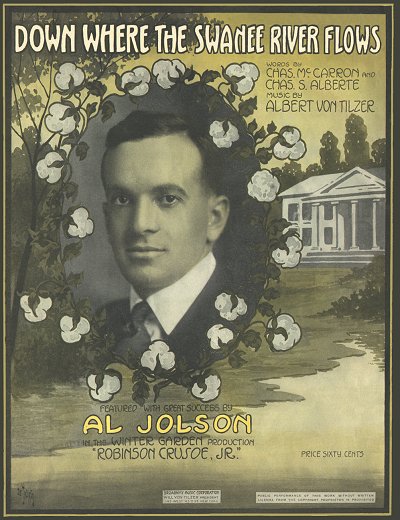 Albert was no slouch in this regard, and Broadway Music published a good number of his war pieces, including I May Be Gone For A Long, Long Time, the post-war sequel I May Stay Away a Little Longer, and When the Sun Goes Down in Flanders. The most famous of these was Au Revoir, But Not Good-Bye (Soldier Boy), although none of them matched the popularity of George M. Cohan's Over There or Irving Berlin's many songs written for the boys in Europe. On their respective draft records, Albert was now shown working with ArtMusic, and Will, now married to Hattie Von Tilzer, as a publisher.
Albert was no slouch in this regard, and Broadway Music published a good number of his war pieces, including I May Be Gone For A Long, Long Time, the post-war sequel I May Stay Away a Little Longer, and When the Sun Goes Down in Flanders. The most famous of these was Au Revoir, But Not Good-Bye (Soldier Boy), although none of them matched the popularity of George M. Cohan's Over There or Irving Berlin's many songs written for the boys in Europe. On their respective draft records, Albert was now shown working with ArtMusic, and Will, now married to Hattie Von Tilzer, as a publisher.
 Albert was no slouch in this regard, and Broadway Music published a good number of his war pieces, including I May Be Gone For A Long, Long Time, the post-war sequel I May Stay Away a Little Longer, and When the Sun Goes Down in Flanders. The most famous of these was Au Revoir, But Not Good-Bye (Soldier Boy), although none of them matched the popularity of George M. Cohan's Over There or Irving Berlin's many songs written for the boys in Europe. On their respective draft records, Albert was now shown working with ArtMusic, and Will, now married to Hattie Von Tilzer, as a publisher.
Albert was no slouch in this regard, and Broadway Music published a good number of his war pieces, including I May Be Gone For A Long, Long Time, the post-war sequel I May Stay Away a Little Longer, and When the Sun Goes Down in Flanders. The most famous of these was Au Revoir, But Not Good-Bye (Soldier Boy), although none of them matched the popularity of George M. Cohan's Over There or Irving Berlin's many songs written for the boys in Europe. On their respective draft records, Albert was now shown working with ArtMusic, and Will, now married to Hattie Von Tilzer, as a publisher.Albert and his colleagues did not need to worry about what to write about after the was since the next war would be waged by supporters of the Volstead Act and the onset of national prohibition. One of a pair of blues he composed with Edward Laska was The Alcoholic Blues in 1919, but another surprisingly positive comic song was I Never Knew I Had a Wonderful Wife (Until the Town Went Dry). With yet another frequent partner, Neville Fleeson, Albert wrote Dear Old Daddy-Long-Legs which saw brisk sales for a few years. But it was with Brown that another mega-hit emerged, Oh By Jingo! (Oh By Gee, You're the Only Girl For Me), which quickly became a favorite in vaudeville. Albert appeared in the 1920 census as a composer, now in his own home with Caddie, and Will as a publisher, with Harold Gumm now fully engaged as an entertainment lawyer, no doubt on retainer by his famous brothers.
Burned three times, Albert nonetheless believed he could still make it big on Broadway with a musical. Urged on by the growing number of theaters and the successes of Ziegfeld and Berlin, he and Fleeson first worked on What's the Odds in 1919, which did not make it very far.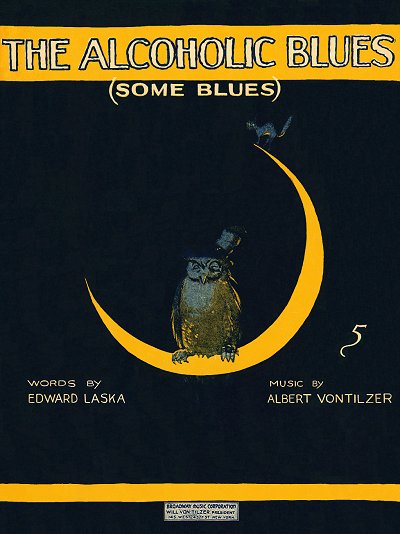 Albert next penned Honey Girl with Fleeson and Edward Clark in 1920. This one finally hit the mark and gave him a success his brother Harry was not able to capture, running initially for 32 performances at the Cohan theater, followed by another 110 a few blocks away. That same year saw yet another standard that would require twenty years to fully catch on, but still was well regarded when it came out, Included at some point in Honey Girl but sold separately from the pieces included in the score, I'll Be With You in Apple Blossom Time was a charming waltz song that blossomed into a 4/4 swing hit in the 1940s. From 1920 on, however, Albert's melodies tended less towards current song styles and more to the sentimental or ragtime styles of previous decades, and no more big hits were coming.
Albert next penned Honey Girl with Fleeson and Edward Clark in 1920. This one finally hit the mark and gave him a success his brother Harry was not able to capture, running initially for 32 performances at the Cohan theater, followed by another 110 a few blocks away. That same year saw yet another standard that would require twenty years to fully catch on, but still was well regarded when it came out, Included at some point in Honey Girl but sold separately from the pieces included in the score, I'll Be With You in Apple Blossom Time was a charming waltz song that blossomed into a 4/4 swing hit in the 1940s. From 1920 on, however, Albert's melodies tended less towards current song styles and more to the sentimental or ragtime styles of previous decades, and no more big hits were coming.
 Albert next penned Honey Girl with Fleeson and Edward Clark in 1920. This one finally hit the mark and gave him a success his brother Harry was not able to capture, running initially for 32 performances at the Cohan theater, followed by another 110 a few blocks away. That same year saw yet another standard that would require twenty years to fully catch on, but still was well regarded when it came out, Included at some point in Honey Girl but sold separately from the pieces included in the score, I'll Be With You in Apple Blossom Time was a charming waltz song that blossomed into a 4/4 swing hit in the 1940s. From 1920 on, however, Albert's melodies tended less towards current song styles and more to the sentimental or ragtime styles of previous decades, and no more big hits were coming.
Albert next penned Honey Girl with Fleeson and Edward Clark in 1920. This one finally hit the mark and gave him a success his brother Harry was not able to capture, running initially for 32 performances at the Cohan theater, followed by another 110 a few blocks away. That same year saw yet another standard that would require twenty years to fully catch on, but still was well regarded when it came out, Included at some point in Honey Girl but sold separately from the pieces included in the score, I'll Be With You in Apple Blossom Time was a charming waltz song that blossomed into a 4/4 swing hit in the 1940s. From 1920 on, however, Albert's melodies tended less towards current song styles and more to the sentimental or ragtime styles of previous decades, and no more big hits were coming.Jules Von Tilzer also made it into the news as Albert was testing the Broadway waters again. He was allegedly stabbed by his wife, Estelle, as he lay sleeping one night in late February 1920. Estelle's story was a bit different. She had reacted to a telephone call from a mysterious woman who alerted her that Jules had been fooling around with another woman for some three years. When confronted with that news, the 225 pound Jules denied the allegation and reportedly jumped out of bed. The 90 pound Estelle grabbed a knife in self-defense. Neither of them seemed to be able to recall how the knife entered his body. It was not favorable publicity for the other Von Tilzers, Harry in particular, who was also mentioned in the articles on the incident as being the brother of Jules.
Difficulties and Downslides
In December, 1921, Albert opened his own publishing business with Fleeson. It is not known if there was any disagreement with Will that might have spurred this action, or if it was simply a branching of the Von Tilzer publishing empire. An announcement in The Music Trade Review of December 3, 1921, read: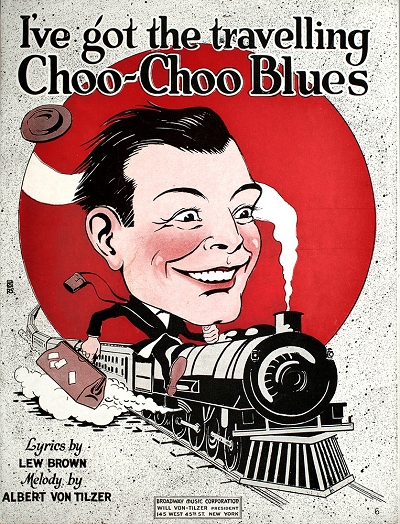 "Albert Von Tilzer, one of the best known of present-day popular composers, and Neville Fleeson, his writing partner, who for many years were on the staff of the Broadway Music Corp., have severed their connections with that company. Albert Von Tilzer has entered the ranks of the publishers under his own name, with offices at 1591 Broadway." The Albert Von Tilzer Publishing Company was short-lived, however. In an announcement published in September 1922, Albert noted that he had "been liquidating his business with a view to engaging practically exclusively in the writing of vaudeville sketches and acts. Such songs as Mr. Von Tilzer may write in the future will be offered to publishers on a free-lance basis." Albert and Neville ended up selling the assets to their distributor, Jacob Mittenthal, Incorporated. Encouraged by his recent success on Broadway, he wrote The Gingham Girl in late 1922 with Fleeson, and it ran nearly a year at 322 performances. Wary of jumping the gun lest it close early, the songs were not published until early 1923. That same year would see Adrienne make it to the stage, this one with future partner and lyric writing veteran A. Seymour Brown. It lasted around eight months at 235 performances.
"Albert Von Tilzer, one of the best known of present-day popular composers, and Neville Fleeson, his writing partner, who for many years were on the staff of the Broadway Music Corp., have severed their connections with that company. Albert Von Tilzer has entered the ranks of the publishers under his own name, with offices at 1591 Broadway." The Albert Von Tilzer Publishing Company was short-lived, however. In an announcement published in September 1922, Albert noted that he had "been liquidating his business with a view to engaging practically exclusively in the writing of vaudeville sketches and acts. Such songs as Mr. Von Tilzer may write in the future will be offered to publishers on a free-lance basis." Albert and Neville ended up selling the assets to their distributor, Jacob Mittenthal, Incorporated. Encouraged by his recent success on Broadway, he wrote The Gingham Girl in late 1922 with Fleeson, and it ran nearly a year at 322 performances. Wary of jumping the gun lest it close early, the songs were not published until early 1923. That same year would see Adrienne make it to the stage, this one with future partner and lyric writing veteran A. Seymour Brown. It lasted around eight months at 235 performances.
 "Albert Von Tilzer, one of the best known of present-day popular composers, and Neville Fleeson, his writing partner, who for many years were on the staff of the Broadway Music Corp., have severed their connections with that company. Albert Von Tilzer has entered the ranks of the publishers under his own name, with offices at 1591 Broadway." The Albert Von Tilzer Publishing Company was short-lived, however. In an announcement published in September 1922, Albert noted that he had "been liquidating his business with a view to engaging practically exclusively in the writing of vaudeville sketches and acts. Such songs as Mr. Von Tilzer may write in the future will be offered to publishers on a free-lance basis." Albert and Neville ended up selling the assets to their distributor, Jacob Mittenthal, Incorporated. Encouraged by his recent success on Broadway, he wrote The Gingham Girl in late 1922 with Fleeson, and it ran nearly a year at 322 performances. Wary of jumping the gun lest it close early, the songs were not published until early 1923. That same year would see Adrienne make it to the stage, this one with future partner and lyric writing veteran A. Seymour Brown. It lasted around eight months at 235 performances.
"Albert Von Tilzer, one of the best known of present-day popular composers, and Neville Fleeson, his writing partner, who for many years were on the staff of the Broadway Music Corp., have severed their connections with that company. Albert Von Tilzer has entered the ranks of the publishers under his own name, with offices at 1591 Broadway." The Albert Von Tilzer Publishing Company was short-lived, however. In an announcement published in September 1922, Albert noted that he had "been liquidating his business with a view to engaging practically exclusively in the writing of vaudeville sketches and acts. Such songs as Mr. Von Tilzer may write in the future will be offered to publishers on a free-lance basis." Albert and Neville ended up selling the assets to their distributor, Jacob Mittenthal, Incorporated. Encouraged by his recent success on Broadway, he wrote The Gingham Girl in late 1922 with Fleeson, and it ran nearly a year at 322 performances. Wary of jumping the gun lest it close early, the songs were not published until early 1923. That same year would see Adrienne make it to the stage, this one with future partner and lyric writing veteran A. Seymour Brown. It lasted around eight months at 235 performances.Harry Von Tilzer's firm went into receivership for a while in 1922, but he would emerge over the next few years in fairly good shape. Broadway Music similarly suffered a bankruptcy in late 1922, but was discharged from it in early 1923 offering a 25% settlement with creditors based on the promised of a successful reorganization. In this way, Will kept Broadway Music going at a brisk pace into the mid-1920s and the reorganized company kept its promise, coming out of the predicament even stronger. One good decision by Will was the 1927 reissue of a 1918 tune that he had long thought was "ahead of its time" when first published. In doing so, he turned After You've Gone by Creamer and Layton into a hit nearly a decade after its first publication, flooding the market with sheet music, recordings and piano rolls. Also in 1927 he launched an unusual campaign for a particular song, and in an article in The Music Trade Review of October 22, 1927, some of his past advertising innovations were also featured:
"Blind" Campaign on Song by Broadway Music Corp. Brings Unusually Satisfactory Results
Now that the series of mysterious advertisements pertaining to the new fox-trot ballad, "Make My Cot Where the Cot-Cot-Cotton Grows," has been concluded and the secret has been revealed that Will Von Tilzer, president of the Broadway Music Corp., New York, is backing the number as publisher, some interesting facts concerning the whole episode have come out. Quite a number of the boys in the songwriting business tried to figure out who wrote the number, but none of them guessed correctly.
The stunt of using "blind" advertisements in the trade papers to introduce the number was characteristic of Will Von Tilzer and brings to mind some of his doings in the exploitation field in the past. He was the first music publisher to use a reversed plate for advertising songs to the trade and professional public, and it took him two years to induce the manager of the old Clipper to accept his "copy." Mr. Von Tilzer was also the first publisher to buy an entire page for songs and use not more than an inch of it in the center, leaving the rest white.
As a result of his recent novel advertising of "Cot-Cot-Cotton," the professional folk have been talking and guessing and Mr. Von Tilzer has tried to get dealers in various parts of the country to solve the musical problem. The number is now getting away to a better start than any number he has handled in recent years. One prominent orchestra leader stated that if the number does not click with a big bang, he, the leader, will eat all the orchestrations the firm happens to have left over.
Albert Von Tilzer's last stage musical would be Bye Bye Bonnie in 1927, written with Fleeson. After 125 performances it closed his career as a writer of stage musicals. His career as a songwriter in New York was also winding down.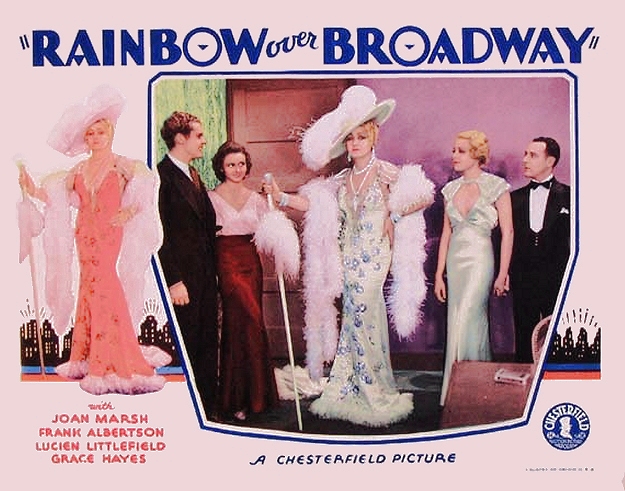 There was one more unproduced play, a musical extravagance that may have been intended for younger audiences, based on the story of Little Red Riding Hood. Fragments of this still exist in an archived collection. Even though Albert and Seymour had composed a couple of pieces before, they formally announced a new partnership in 1928, starting with the campaign piece He's Our Al in support of Democratic Presidential candidate Al Smith. In spite of a months long push by Will in promoting the song, Smith eventually lost the election and the piece was all but forgotten in short order. Soon after there was a folio of his works released by Broadway Music, Famous Songs of the Past, which contained many of what were by now considered his "old-time" songs. The folio quickly became a best-seller for the company.
There was one more unproduced play, a musical extravagance that may have been intended for younger audiences, based on the story of Little Red Riding Hood. Fragments of this still exist in an archived collection. Even though Albert and Seymour had composed a couple of pieces before, they formally announced a new partnership in 1928, starting with the campaign piece He's Our Al in support of Democratic Presidential candidate Al Smith. In spite of a months long push by Will in promoting the song, Smith eventually lost the election and the piece was all but forgotten in short order. Soon after there was a folio of his works released by Broadway Music, Famous Songs of the Past, which contained many of what were by now considered his "old-time" songs. The folio quickly became a best-seller for the company.
 There was one more unproduced play, a musical extravagance that may have been intended for younger audiences, based on the story of Little Red Riding Hood. Fragments of this still exist in an archived collection. Even though Albert and Seymour had composed a couple of pieces before, they formally announced a new partnership in 1928, starting with the campaign piece He's Our Al in support of Democratic Presidential candidate Al Smith. In spite of a months long push by Will in promoting the song, Smith eventually lost the election and the piece was all but forgotten in short order. Soon after there was a folio of his works released by Broadway Music, Famous Songs of the Past, which contained many of what were by now considered his "old-time" songs. The folio quickly became a best-seller for the company.
There was one more unproduced play, a musical extravagance that may have been intended for younger audiences, based on the story of Little Red Riding Hood. Fragments of this still exist in an archived collection. Even though Albert and Seymour had composed a couple of pieces before, they formally announced a new partnership in 1928, starting with the campaign piece He's Our Al in support of Democratic Presidential candidate Al Smith. In spite of a months long push by Will in promoting the song, Smith eventually lost the election and the piece was all but forgotten in short order. Soon after there was a folio of his works released by Broadway Music, Famous Songs of the Past, which contained many of what were by now considered his "old-time" songs. The folio quickly became a best-seller for the company.Seeing opportunity in 1929 as the sound film The Jazz Singer started spawning musicals in the movies, Albert left his brothers behind in New York City and relocated to Los Angeles where he and Caddie would stay the rest of their lives. Work was sporadic in the beginning, but he is still listed as a composer in the 1930 census. Writing in this period largely with George Whiting, Harry MacPherson and Ted Fiorito, Albert did manage to get some songs placed in musicals or music-oriented movies. His most prominent contributions appear in the ironically titled Rainbow Over Broadway in 1933 and Here Comes the Band in 1935, and MGM film featuring Virginia Bruce and bandleader Ted Lewis with his orchestra. After his, Albert only came up with the occasional melody, including an interesting set of cowboy tunes for stock Westerns written with MacPherson in 1938. He also co-wrote brother Harry's final contribution, Sierra Moonlight, in 1943. For the 1940 census, taken in West Hollywood, California, Albert and Caddie were still together, and he was again listed as a composer/song-writer. Caddie died in February 1950, so for the 1950 enumeration taken in April his status was as widowed, but Albert still listed himself as a songwriter for stage and screen.
For the 1940 census, Jack Von Tilzer and his family were living in Hempstead on Long Island, and he was working as an agent for radio artists. As of 1942, Will, who had been married to his wife Blanche, 22 years his junior, in the late 1930s, was still shown heading Broadway Music in New York. The 1950 enumeration showed him again as a music publisher, with Blanche and two young children, Stanley Martin (1938) and Marian Jane (1944) added to the family. In May of 1952 he died of a heart attack in his car, which was being driven by Blanche at the time, on the Cross County Parkway. Harry had died in 1946. His oldest brother, Jules, passed on in October, 1954. After having been retired for many years, Albert finally passed on in 1956 in Beverly Hills, California. He and Harry were both inducted into the Songwriter's Hall of Fame in 1970. The final years of the lives of Will, Jack and Harold have been hard to piece together, but hopefully additional research will bring closure to their stories, and help to codify their significant roles in American music.




 Published Composers
Published Composers